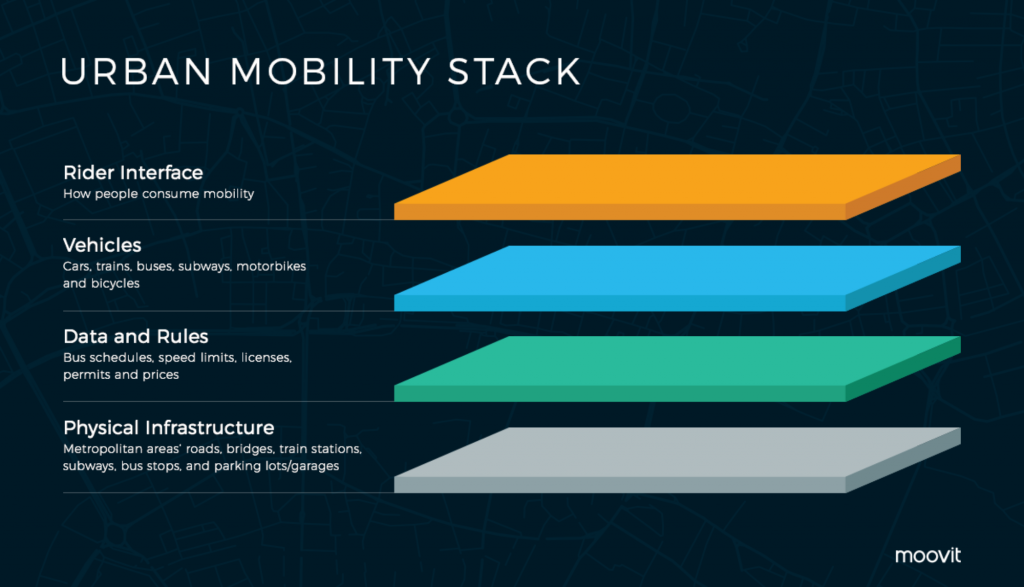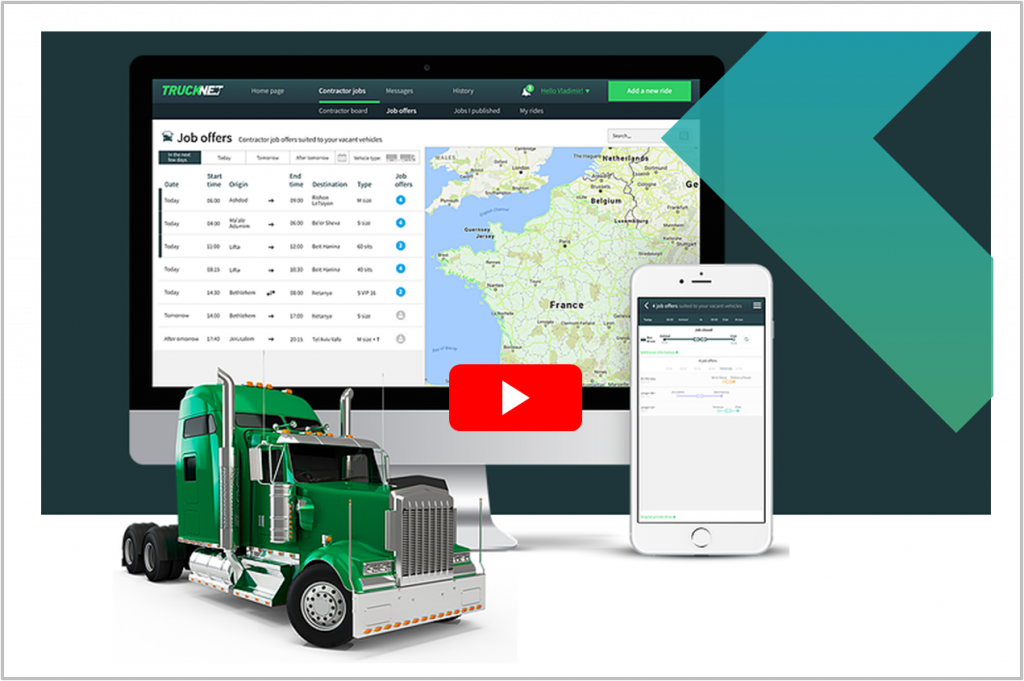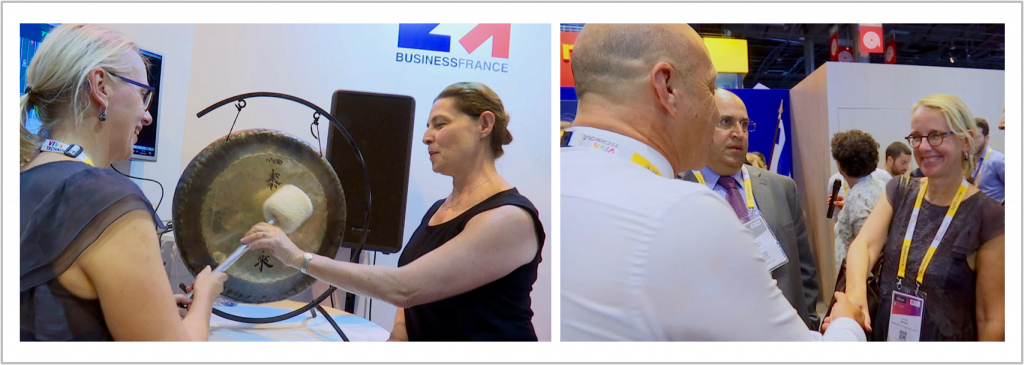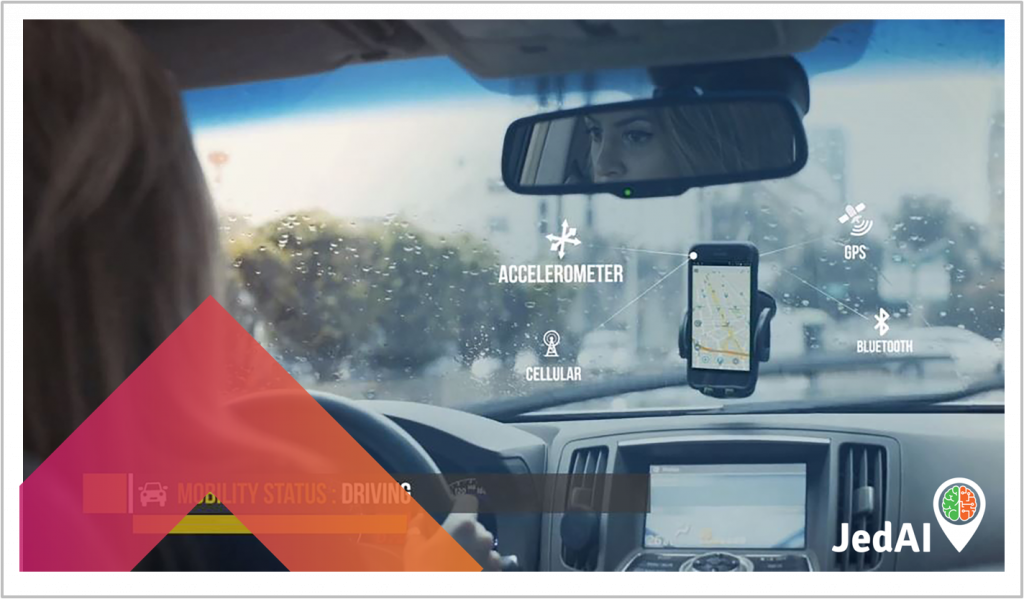Three Israeli startup companies, all supported by the Israel Innovation Authority, are using innovative technological solutions to take part in the global transportation revolution. Meet the next generation of public transport, the green solution for transportation logistics, and the technology that makes finding parking spots, easier.
The field of transportation, both in Israel and around the world, faces revolutionary changes expected to take place in coming years. Motor vehicles are becoming smart and computerized systems that will help the human driver reach his destination efficiently, comfortably and safely and, that at some point, will even replace him as the driver. This revolution will have far-reaching ramifications on humanity as a whole in a range of fields: from traffic to the entire culture of mobility. Questions such as where we will live, how will we travel from one place to another, how private and public transportation will operate – are all open questions to which an answer has yet to emerge. In fact, the transition from a model of vehicle ownership to one of transportation as a personally tailored service, rich in information and connectivity technologies, may completely transform a range of human activities and create unpredictable economic and social opportunities and challenges.
Almost everyone in the world using a public transport smartphone application is familiar with the Moovit app. But Moovit offers much more than information about the arrival time of the next bus. Behind the useful app stands one of the most successful smart transportation companies in the world. If developments continue according to the current trend, Moovit will likely become an integral part of the way in which we use public transport in coming decades.
Yovav Meydad, VP of Products and Marketing at Moovit, joined the company about four years ago. Already then, Moovit, which received assistance in the app’s development stage, as part of the Early Stage Incentive Program operated by the Innovation Authority’s Startup Division, had a million users – mainly in Israel and in a limited number of other destinations worldwide. Between 2013-2017, Moovit expanded and reached 80 million users by providing its service globally, in more than 1500 cities in 78 countries. Today, it is the leading public transport application in the world.
Moovit’s systems rely on information about public transport lines. In many cities around the world, this information is made available to the developers by the public transport authority in the relevant city or country, so that they can assimilate it into their app, just as Moovit has done.
“At the same time”, Meydad says, “there are hundreds of cities around the world in which the information does not exist digitally or exists in a form that is inaccessible to the developers. In order to enable the users in those cities to use Moovit, it was necessary to chart the public transport information with the help of local users. This is where a tool we have developed comes into play. The tool, called Transit Data Editor, is an internet tool that runs in the browser and enables local people to map their knowledge of their city’s public transport. This includes information such as location of stations, names of lines, their schedules etc. These people act voluntarily, sometimes together with a few others, for the benefit of all, similar to the Wikipedia model. The result enables the residents of both large and smaller cities to make their city’s public transport more accessible, convenient, available and efficient for the general public. We have built a large community that today numbers more than 200 thousand local editors (‘Mooviters’) in approximately 150 cities worldwide.”
The members of the Moovit community play an active role in realizing the vision and, thanks to them, a new city is added to the app every day. “We currently have approximately 2000 city projects at various stages of mapping”, Meydad explains. “In other companies, if the information isn’t officially accessible, the service just doesn’t exist in that city. This means that in many cities, Moovit is the only company in possession of public transport information.”
Another of Moovit’s products is Moovit Carpool – a tool that connects drivers and passengers who want to travel from one place to another. “Over time we added other mobility solutions that serve our users, including comparison of different forms of mobility – public transport, taxis, shared bicycles and carpooling”, says Meydad.
The third group of products offered by Moovit is ‘Smart Transit Suite’ that is helping make cities smarter. “Over the years, we have made contact with public transport companies around the world and observed needs for which there is no answer today”, Meydad says. “Using the information that we gather from Moovit users, we can reach more conclusions regarding the nature of people’s mobility within a metropolis. Until now, attaining this information was complex and required public surveys – an expensive, inaccurate and limited process.”
“Our technology enables drawing of conclusions by analyzing the mobility of the app’s millions of users in the city. Among the questions analyzed are: where are they travelling back and forth? which mode of transportation do they use? If they use public transport, which line did they use and at which stations did they get on and off? This is a product called Moovit Urban Mobility Analytics – a tool for analyzing urban mobility that is aimed at clients who are large entities, city planners, public transport authorities etc. The tool provides insights and assists these organizations in improving and streamlining the city’s mobility processes.”
Moovit’s Vision of Future Smart Transportation
“This is a fascinating period for the world of transportation that is currently in the midst of a real revolution”, Meydad says. “In order to illustrate the changes occurring in this world, we have divided the urban mobility world into four levels and created an abstract model that we call Urban Mobility Stack. The first level of this model is that of the physical infrastructures – trains, bridges, roads etc. Above that is the level of the traffic laws and rules that help ensure the prevention of chaos while using the infrastructures. The next level up is that of the fleet of motor vehicles themselves and the final level is that of the interface with which public transport has been used for the past century – the manner in which bus and train schedules were checked, journeys paid for etc.”

“In recent years a real revolution has occurred, one that began in the upper level of the model. The smartphones and apps that accompany every facet of our lives have also led to people using them for public transport, including to receive information and directions, to order trains and taxis and for travel payment (apps such as Moovit, Uber, Get). We are now starting to see how the revolution is descending down through the levels. The second level is a revolution of motor vehicles that are becoming electric and autonomous. Leading companies at this level include Waymo, Mobileye, Uber, Tesla and others.”
“The next level to undergo revolution is that of the traffic laws, that will need to change once there are autonomous vehicles. This level will be completely computerized and the computers will have to know the whereabouts of every vehicle in the city in real time as well as the traffic and driving laws in order to be able to navigate the vehicles to the end customer. In order to enable this, the infrastructures level will also have to be adapted to changing needs. For example, there will no longer be a need for a large number of big parking areas in cities, however it will be necessary to plan for multiple points at which travelers can embark and disembark from autonomous vehicles. This will not happen overnight but we are at the height of the revolution.”
“Where is Moovit in this revolution? We don’t intend to manufacture motor vehicles or to pave infrastructures. We view ourselves as the leading application in the interface with the users (B2C – business to client) and as the leading company at the laws and information level. The computers will require extremely precise information about the whereabouts of public transport: where every train is in real time. The algorithm needs to know the information in the most accurate possible form because only then will it be able to understand when the train will arrive and how many vehicles to allocate for this purpose. In practice, this is an operating system for the city and we want to be a significant player in its construction at the B2B (business to business) and B2G (business to government) levels.”
Filling the Lorries, Reducing Pollution
Hanan Friedman, CEO of TruckNet, became exposed to the world of logistics during his time at other companies. As part of his job, Friedman sought a solution for transferring solar panels from the ports to their final destination. With experience he identified a logistical problem in the world of transportation and realized that the existing solutions’ technology was extremely basic and minimal. He subsequently discovered that 30 percent of the lorries in Israel and around the world travel the roads while empty of merchandise. This leads among others, to low profitability for the companies and drivers, economic inefficiency, increased air pollution, unnecessary overcrowding on the roads, and even increased risk of traffic accidents.
“I investigated whether a technological solution existed that would enable the simultaneous increase in profits and reduction of air pollution. I soon realized that no such thing existed and that the world of logistics operated in a low-tech mode. At best, there are optimization programs but they are only intra-organizational. I understood that if we learn how to create big data, we could help everyone become more efficient”, Friedman explains.
TruckNet was founded in 2014 and launched the first commercial system in the world for the smart management of different transportation fleets. The system is based on a cloud platform aimed at the optimization and integration of transportation companies. The technological system is intended for transport and transportation companies that, via smart sharing, save unnecessary trips of empty lorries, thereby contributing to a marked financial and environmental saving.

The next stage was to spread the idea further. “I became familiar with an organization called Ecomotion and with the Fuel Choices Initiative. We subsequently joined forces with the Israeli Ministry of Environmental Protection and from there we went to the Climate Change Conference in Paris where we proposed our idea as a solution. When I returned to Israel, we joined up with Capital Nature and the Innovation Authority and they invested the capital necessary to take us to the next stage.”
“The Innovation Authority is a fantastic body that can really provide support. Every startup venture setting out in Israel can benefit from assistance of entities affiliated with the Ministry of Economy and Industry, the Innovation Authority and the Fuel Choices Initiative. Overseas, Israelis are considered strong in this field and therefore when we arrive at a meeting everyone opens their ears, even before they close the door”, says Friedman.
TruckNet has recently established its first international branch in Paris and benefits from collaboration with the French Ministry of Economy, sponsored by the French Embassy in Israel. Approximately 4500 French transportation companies, with a total of about 280 thousand lorries between them, participate in the local platform (by comparison, this is the total number of lorries in Israel). The optimization of the transportation companies’ activity is based on GPS and user information. The result is smart and profitable travel sharing. “The lorry is always full – and the world is a cleaner place”, Friedman explains.
“The company has recently recruited another investor according to an estimated corporate valuation of 12.5 million dollars. As of today, after completing an initial pilot for 300 companies and drawing the relevant conclusions, we are proceeding with construction of the system.”
“In my view, we need to create a system with a search engine like Google’s in the B2B transportation world. Such a system will enable significantly better accessibility to information. That’s how I started the pilot in Israel. But our system also has something much deeper and more fundamental: while the subject of outsourcing is developing globally, in the transportation field, sub-contracting comprises only 8 percent compared to 30 percent in other fields. Why? Because even if we know that we both own a transportation company operating in different places, there are still things that we don’t know about each other. By contrast, the system we have created knows everything about the lorry being operated via outsourcing – for example, the identity of the driver, and where it is – and with all the relevant details, causes me to feel as if it’s my lorry.”
“The system also knows how to transform a lorry from a non-technological vehicle into a completely technological one by means of a tablet. In other words, the system can also connect to an old lorry travelling in less technologically developed areas and still provide the company it belongs to with all the advantages. In the world of logistics, this has tremendous significance because even in non-technological places such as India for example, the driver has a tablet that enables him to use the lorry’s smart management system. Using the system that we have developed, the same technology can be installed in the Indian driver’s lorry, and even be used for payment.”
“The first thing people think of is Uber, but in my opinion Uber cannot win in heavy logistics in the coming decade. The reason is simple: when I want to transfer a million Euros worth of computers, I will choose the best, the most reliable and the most efficient means and not the cheapest. My message to the companies is: I don’t reach the end customer. The end customer is yours. I provide service to the companies that supply the tools. I don’t determine how much you will receive, just make you more efficient. The next step is technology. In another 15 years, the lorries will be autonomous and I believe that they will be capable of providing solutions with regards to work roster and optimization. We will be able to provide a service solution for those autonomous lorries and they will operate in tandem and will be connected to our same optimization program.”
“By the way, our system supports state regulation in the country in which it operates. Lorries that are not roadworthy or that do not have comprehensive insurance and a valid license will not be part of our coordination. Lorries are involved in 35 percent of the serious accidents worldwide. Among other factors, this is because someone has planned their work day incorrectly.”

The Mobile Phones’ Sensors Revolution
An Israeli startup company Anagog attained a rare honor at the Barcelona MWC Mobile Congress in 2016 when it beat 900 other companies from around the world and won the ‘Best Mobile Innovation in Automotive Award’.
Anagog started out ten years earlier in 2006 when Yaron Aizenbud joined forces with Gil Levy in an attempt to enhance the quality of life by using GPS information received then on mobile phones. “We thought that automatic identification of leaving a parking space was a good place to start”, says Aizenbud, who founded the company together with Levy. “We created a technology that analyzes the different sensors in a smart phone in order to understand that a certain parking space was about to become available and that updates the drivers in the surrounding area in real time. The program doesn’t just know how to analyze the information received from the mobile users based on the ‘wisdom of the crowd’, but also, enables the telephone to learn its owner’s behavior patterns so that it can offer him services personally tailored to his needs.”
“Our first use was an application that identifies when a particular parking space is about to become available and informs others. Over time however, we understood that this is much bigger – that we have something here that enables the application to provide their users with better, more personal real-time service. In order to maintain user privacy, the technology allows your telephone – and not necessarily the application supplier – to understand you.”
“Our first collaboration was with Pango that originally created an app to pay for parking but that, with our help, now also provides a service for locating parking. We received funding for our parking solution project with Pango from the Innovation Authority. This is an amazing body and we greatly appreciate the support that the State offers entrepreneurs.”
The Anagog team call the startup they founded “The Mobility Status Company”. “At a certain stage, we realized that parking solutions are just one aspect that can be created with our technology”, Aizenbud explains. “Because the technology sits in the smartphone, the telephone itself can use it – accurately and with low battery consumption – to identify its owner’s mobility status. It is important to emphasize that there is significant consideration given to privacy and security. The system is designed such that all the important data remains in the telephone and all the information leaving it is completely anonymous.”


“So actually, the telephone understands when someone gets up in the morning, when he starts travelling, and when he parks the car. The telephone understands if a person is currently walking, running or riding a bike, and is also capable of understanding when he enters a certain area – a shopping mall or a room. We have packaged this capability as a software package named JedAl that is intended for application developers. It enables them to significantly improve the connection with their end users and to be better than their competitors. When they enhance user experience, they increase their income from the applications.”
“We are among the most stringent with regards to privacy”, Aizenbud promises, and explains: “We have three principles from which we never deviate in order to preserve the maximum degree of privacy. The first is to provide the user with extremely significant value in exchange for installing an application containing our technology, the second is to clearly request his permission, and the third principle is that if we upload information from the device to the cloud, it must be completely anonymous. One of our competitive advantages is that we have succeeded in enabling an analysis of the sensors and an understanding of the user’s mobility status on the telephone itself without the need for communication with a central computer. This is a very important element in guaranteeing user privacy.”
“There is a wide range of uses”, Aizenbud elaborates, “starting with the field of parking, but it can also be used in other areas such as navigation apps, alerts regarding speed traps even when the application is turned off, and others. Extremely high-value information can also be provided in other categories – for example, weather and even dating apps. We have the ability to allow information about the proximity to others. For example, we can enable the telephone to provide people walking in a certain radius with an alert about areas that should be avoided or about the popularity of restaurants in the surrounding area. Gaming such as Pokemon GO can also be integrated. Yet another application is insurance – for example, the possibility to charge a dynamic premium based on user profile – because we enable the telephone to understand how much a person drives, destinations, times and speeds. In addition, this is a very strong platform for personalized advertising.”
“Our supply has greatly expanded recently and we provide a wide range of additional services. The device’s high-quality learning of user behavior over time also allows prediction. For example, should I travel now with my private car, a taxi, a bus or even walk? Another feature linked to smart transportation is travel sharing, such as Uber.”
“More than 20 million users around the world have downloaded applications that implement our technology. Larger numbers of people lead to more in-depth work of machine learning. This is a very buzzing field with which we can conduct in-depth work and enable the telephone to understand user behavior in order to allow the artificial intelligence systems to offer personalized services. All the computerization power sits in the device itself and communication with a central computer is unnecessary. This significantly preserves battery level, maintains user privacy and is much faster.”
“We presently have 16 patents and 10 million users around the world. Our primary goal is to be a leader in capability and, as I mentioned previously, there is a wide range of fields in which we can provide value. One of the challenges is to remain focused and to be a world standard in the field of artificial intelligence related to location-based services.”
